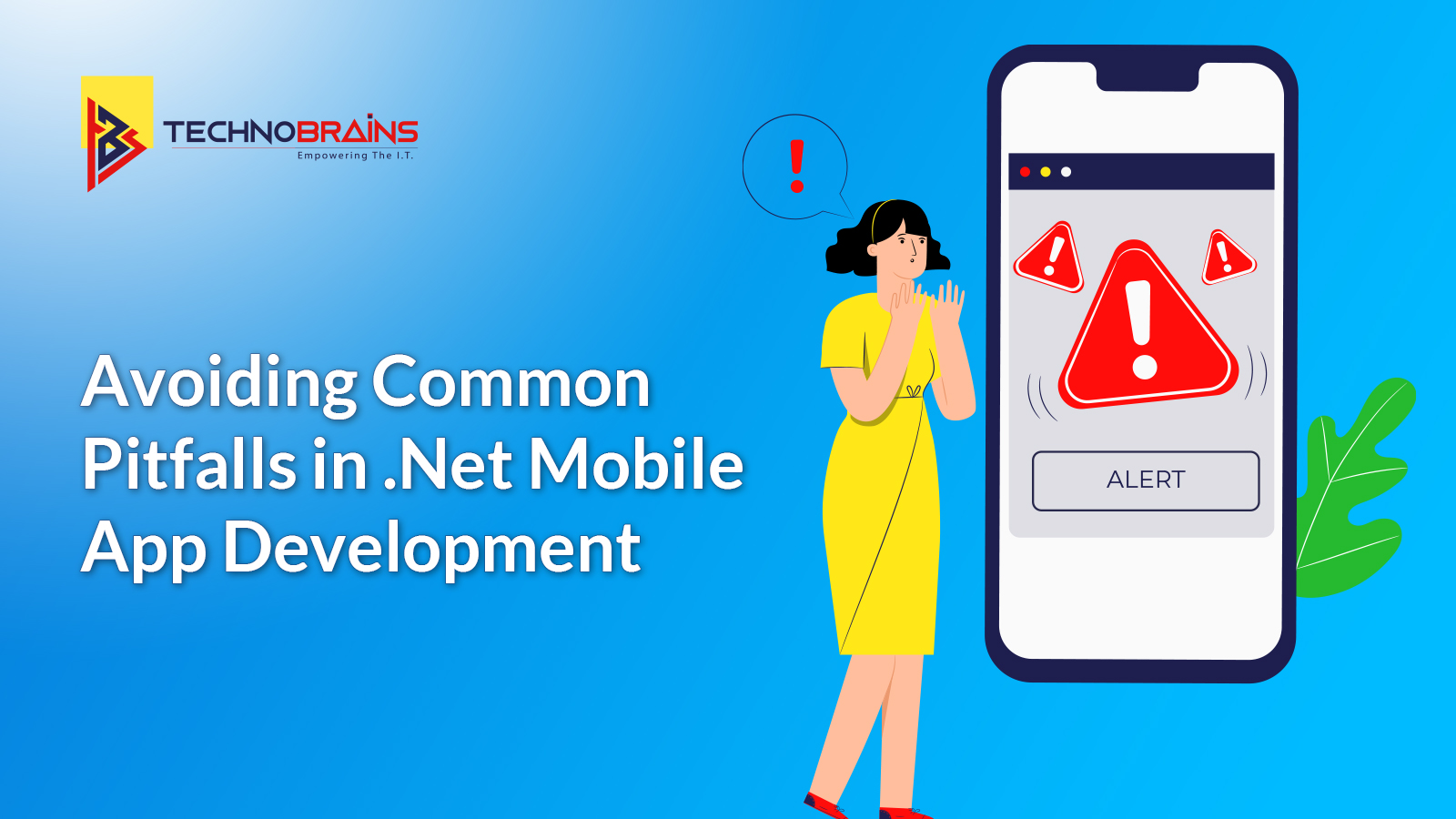
Mobile app development has witnessed exponential growth over the years, and with the increasing demand for innovative and user-friendly applications, developers face various challenges. In the world of .NET mobile app development, avoiding common pitfalls is crucial for delivering successful and efficient applications. In this blog, we will explore the most common pitfalls in .NET mobile app development and provide insights on how to avoid them, ensuring a smooth and productive development process.
The Growth of Mobile App Development
The proliferation of smartphones and the widespread adoption of mobile technology have driven the growth of mobile app development. From business applications to entertainment and social media, mobile apps have become an integral part of our daily lives.
Importance of Avoiding Pitfalls
Avoiding common pitfalls in .NET mobile app development is essential for several reasons. It ensures the creation of high-quality, user-friendly apps that cater to the needs of the target audience. Additionally, by avoiding mistakes and learning from others’ experiences, developers can save time, resources, and effort in the development process.
Understanding the.Net Mobile App Development Process
To create successful .NET mobile apps, developers must grasp the fundamental stages of the development process.
Requirements Gathering
The first phase involves gathering and analyzing requirements to define the app’s scope and functionalities. Identifying user needs and expectations allows you to prioritize features and functionality as it determines the core features to include in the initial release and planning future enhancements.
Design and UI/UX Considerations
The design phase focuses on creating an intuitive and visually appealing user interface. Creating Intuitive and User-Friendly Interfaces design the app with a focus on ease of use and seamless navigation. Ensuring the app’s design follows platform-specific guidelines to deliver a consistent user experience.
See Also: 10 Must Have Skills For UX Designers
Testing and Quality Assurance
Thorough testing is a crucial phase where we need to identify and resolve issues before the app’s release. It undergoes various tests and verification, such as
- Functional testing
- Usability testing
- Performance testing
Pitfalls in Requirements Gathering
The requirements-gathering phase is critical for laying a solid foundation for the app. Here are common pitfalls to avoid:
Insufficient Market Research
Failing to conduct market research can result in an app that doesn’t meet user expectations or lacks a competitive edge.
So, you need to understand the target audience by conducting market research or to identify their preferences and needs.
Keep track of how your competitors work on it by identifying its unique selling points and potential gaps in the market.
Design and UI/UX Pitfalls
An appealing design and smooth user experience are crucial for the success of a .NET mobile app. Avoid these pitfalls by
Ignoring User Feedback and Testing
Neglecting user feedback and failing to conduct usability testing can result in a suboptimal user experience. So, create a prototype that gathers feedback and validates design decisions before development to enhance the app’s usability and user satisfaction.
Development and Coding Pitfalls

Writing efficient and maintainable code is essential for the long-term success of the app.
Poor Code Quality and Maintainability
Neglecting code quality and maintainability can lead to difficult-to-maintain apps and hinder future updates. So, it’s necessary for periodically reviewing and refactoring code to improve its structure and maintainability.
Lack of Performance Optimization
Performance optimization is a critical aspect of developing .NET mobile apps. Failing to optimize performance can lead to slow and unresponsive apps, resulting in a poor user experience and potentially leading users to abandon the app.
Read Also: Optimizing Performance In Asp.Net Web Forms
Security Vulnerabilities
Security vulnerabilities in .NET mobile app development can pose significant risks to both users and the app’s reputation. In this section, we will explore some common security vulnerabilities and best practices to mitigate these risks.
Testing and Quality Assurance Pitfalls
Thorough testing is essential to ensure the app functions as expected and meets user requirements.
Limited Device and OS Testing
Limited device and OS testing in .NET mobile app development can result in compatibility issues and a suboptimal user experience. Effective device and OS testing contribute to a successful app that caters to a broad user base and delivers an outstanding user experience.
Inadequate User Acceptance Testing (UAT)
Inadequate User Acceptance Testing (UAT) in .NET mobile app development can lead to the release of a subpar app that fails to meet user expectations and requirements.
In this section, we will explore the importance of UAT and how to conduct it effectively to ensure a successful app launch.
Deployment and Launch Pitfalls
Deployment and launch are crucial phases in .NET mobile app development. However, various pitfalls can arise during this process that may impact the app’s success and user experience.
Effective App Store Optimization (ASO)
Effective App Store Optimization (ASO) involves several essential components that collectively contribute to the success of a .NET mobile app in the app stores. Among these components are selecting relevant keywords, crafting compelling descriptions, and utilizing eye-catching visuals. Each aspect plays a crucial role in attracting potential users, improving app discoverability, and increasing downloads.
Optimizing App Listings for Visibility and Downloads
Selecting relevant keywords, writing compelling descriptions, and using eye-catching visuals are vital aspects of a successful App Store Optimization (ASO) strategy for any .NET mobile app.
These three components work in tandem to enhance the app’s visibility, attract potential users, and ultimately drive higher downloads and user engagement.
Leveraging Keywords and Descriptions
Maximizing app visibility through strategic use of keywords and descriptions is a fundamental aspect of successful App Store Optimization (ASO) for any .NET mobile app.
By carefully selecting relevant keywords and crafting compelling descriptions, developers can significantly enhance the app’s discoverability and attract a larger audience of potential users.
Lack of Marketing and Promotion
Failing to promote the app effectively can have detrimental effects on its success in the competitive mobile app market. Without a robust marketing strategy, the app may struggle to gain traction, resulting in low user acquisition and limited overall success.
Post-Launch Pitfalls
Continuing to monitor and improve the app after launch is essential for long-term success.

Neglecting User Feedback and Reviews
Ignoring user feedback and reviews can have detrimental effects on the long-term success of a mobile app, hindering its improvement and damaging its reputation.
User feedback and reviews are invaluable sources of information that provide insights into the app’s strengths, weaknesses, and areas for enhancement. Ignoring or neglecting this feedback can lead to missed opportunities for app growth and result in dissatisfied users.
Importance of Continuous Improvement Based on User Input
Actively seeking and responding to user feedback is a proactive approach that can significantly enhance the app and foster a strong and loyal user community.
By actively engaging with users and acknowledging their feedback, developers can gain valuable insights into user preferences, pain points, and areas for improvement. This two-way communication process fosters a sense of collaboration and trust, resulting in continuous app enhancement and increased user satisfaction.
Responding to User Reviews Professionally
Addressing user reviews in a professional and constructive manner is an essential practice that can have a significant impact on the app’s reputation and user satisfaction.
When developers respond to user reviews with professionalism and a commitment to resolving concerns, they demonstrate a genuine interest in their users’ experiences and show that they value user feedback.
Failing to Plan for Updates and Maintenance
Neglecting to plan for updates and maintenance can have detrimental consequences for a mobile app, leading to an outdated and stagnant user experience, and leaving users frustrated and dissatisfied.
By prioritizing updates and maintenance, developers can demonstrate a dedication to user satisfaction, continued improvement, and competitive excellence in the dynamic landscape of mobile app development.
Wrapping Up
In conclusion, .NET mobile app development offers tremendous potential for creating innovative and user-friendly applications. Moreover, we also know that creating mobile applications is a daunting task as well. Therefore, TechnoBrains Business Solutions takes pride in offering cutting-edge solutions for every software and web development service. Get connected with our experts as they will guide you from start to finish for every development service you require.
TechnoBrains remains committed to evolving its services to address the changing needs of businesses. With a clear vision and a passion for innovation, TechnoBrains is poised to shape the future of technology solutions.
Frequently Asked Questions
Visual Studio is highly recommended due to its powerful features and seamless integration with Xamarin for cross-platform development.
Automated testing helps identify and fix bugs efficiently, saving time and ensuring a more reliable app.
Regularly update your app to support the latest OS versions, ensuring compatibility and access to new features.
While cross-platform development is beneficial for code reuse, prioritize native user interfaces whenever possible to enhance user experience and performance.
Implement strong security measures, such as data encryption and secure communication protocols, to protect user data from potential threats.






